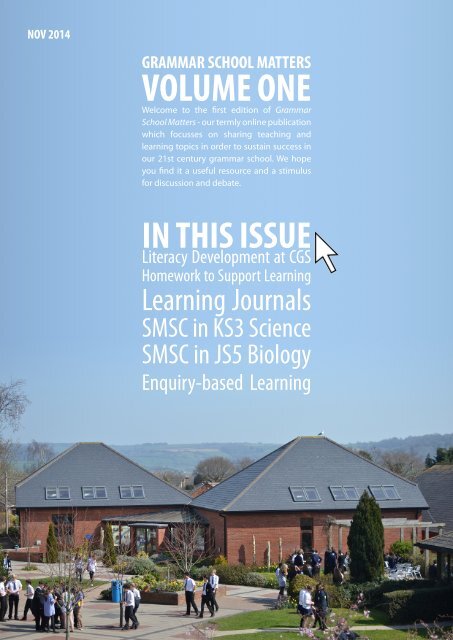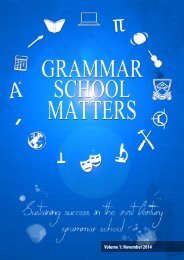Volume 1: November 2014
Create successful ePaper yourself
Turn your PDF publications into a flip-book with our unique Google optimized e-Paper software.
NOV <strong>2014</strong><br />
GRAMMAR SCHOOL MATTERS<br />
VOLUME ONE<br />
Welcome to the first edition of Grammar<br />
School Matters - our termly online publication<br />
which focusses on sharing teaching and<br />
learning topics in order to sustain success in<br />
our 21st century grammar school. We hope<br />
you find it a useful resource and a stimulus<br />
for discussion and debate.<br />
IN THIS ISSUE<br />
Literacy Development at CGS<br />
Homework to Support Learning<br />
Learning Journals<br />
SMSC in KS3 Science<br />
SMSC in JS5 Biology<br />
Enquiry-based Learning<br />
Justine Solomon<br />
Literacy is as important here<br />
at Colyton Grammar as it is<br />
elsewhere, despite the fact that<br />
all students are, by definition<br />
of basic literacy, literate. Our<br />
aim was to develop not just<br />
basic literacy, but also their<br />
spoken and web-based literacy.<br />
From this we hoped to achieve<br />
‘advanced literacy’ within our<br />
students which would prepare<br />
them for further education and<br />
later employment. We aimed<br />
to achieve this by having a<br />
different literacy focus each half<br />
term (HT) whereby members<br />
of staff help to promote different<br />
aspects of literacy or create<br />
documents to be shared across<br />
the teaching staff. There are five<br />
different literacy strands to be<br />
covered throughout the year.<br />
HT2: VOCABULARY<br />
As teachers we frequently<br />
neglect to teach vocabulary<br />
in a manner that is explicit<br />
and direct for our students.<br />
We provide students with the<br />
vocabulary they need, but fail to<br />
teach them how to access that<br />
vocabulary and make the words<br />
their own. We didn’t need to<br />
reinvent the wheel, so I gathered<br />
a number of teaching strategies<br />
that could be used across the<br />
curriculum to improve our<br />
students’ vocabulary. These<br />
included ideas for questioning,<br />
word games that can be used as<br />
starters or plenaries, ongoing<br />
classroom tasks, homework<br />
tasks and finally a few AFL<br />
tasks that will bring the<br />
importance of vocabulary back<br />
into focus. These strategies<br />
were collected in a document<br />
which was distributed to the<br />
whole teaching staff, who were<br />
asked to integrate them into<br />
their lessons. If they had any<br />
other tasks that developed our<br />
students’ vocabulary they were<br />
asked to share these in a specific<br />
folder on our school network<br />
where other subjects could use<br />
them or the idea. Currently<br />
there are examples ranging<br />
from Geography, Psychology<br />
and Business.<br />
HT3: MARKING<br />
After researching existing<br />
literacy policies, I came across a<br />
policy in the staff handbook for<br />
correcting errors in a student’s<br />
work. This had not been updated<br />
in many years and many staff did<br />
not know that it even existed.<br />
As a result, I did a short review<br />
within the working party of<br />
how they marked errors, in an<br />
attempt to establish a common<br />
system. I believed that this<br />
would give consistency across<br />
all subjects in the correction of<br />
errors in writing, which would<br />
make it easier for students to<br />
understand their mistakes and<br />
should therefore lead to faster<br />
progress in language skills.<br />
An updated version was put<br />
together and trialled by the<br />
working party with Year 10<br />
and 12 mocks. A short pupil<br />
voice survey was completed<br />
afterwards, which was very<br />
positive overall. The comments<br />
were applied to the marking<br />
LITERACY<br />
DEVELOPMENT<br />
AT CGS<br />
notation that will now be used<br />
by all members of the teaching<br />
staff from September 2015.<br />
HT4: SPELLING<br />
For this focus I put together a<br />
set of weekly spelling tests to be<br />
completed by all years in their<br />
registration sessions. The plan<br />
was to display the words from<br />
Monday morning in tutor bases<br />
and then test the form group<br />
on Friday morning during<br />
registration. The intention was<br />
to raise the profile and awareness<br />
of correct spelling - which I<br />
believe was achieved, despite<br />
some initial scepticism from<br />
some students. In conjunction<br />
with this I also organised the<br />
inaugural inter-house spelling<br />
bee for Year 8 students. All<br />
members of the year group took<br />
part in an initial spelling test<br />
and then the highest scoring boy<br />
and girl went on to take part in<br />
the spelling bee in front of Years<br />
7 and 8. It was a very positive<br />
event, with subject teachers<br />
from many departments taking<br />
part.<br />
continued overleaf...



